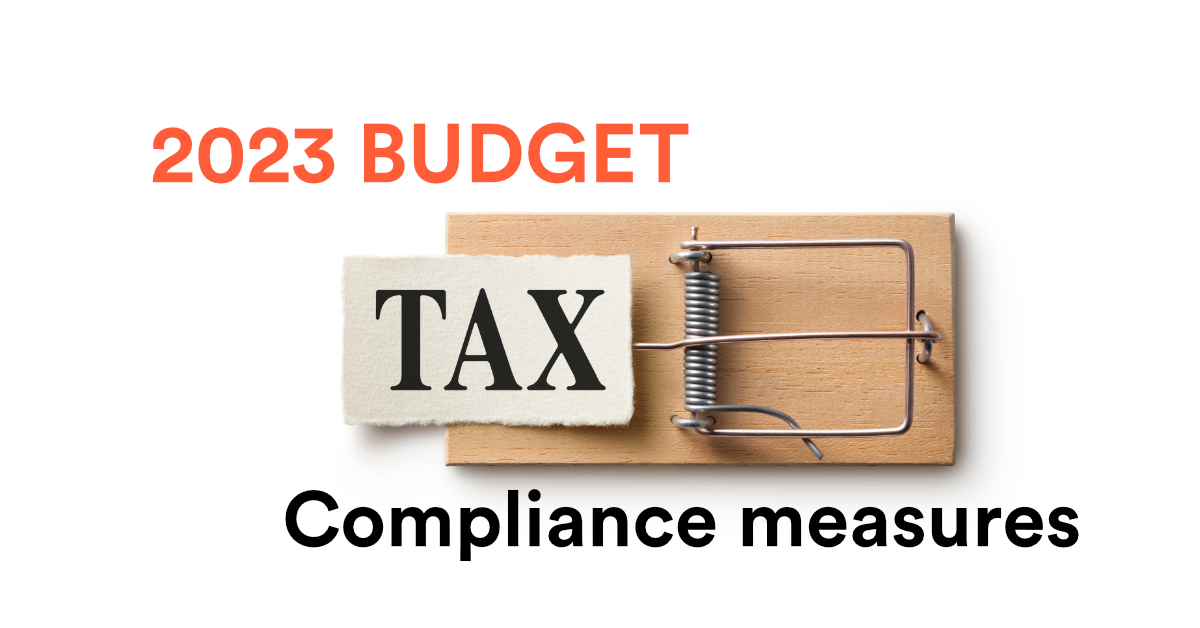

2023 Budget - Compliance and Anti-avoidance Measures
This year's budget contained a suite of measures to clamp down on tax minimisation. There were also several other policy initiatives regarding security and immigration.
This article summarises the significant changes.
Extending Part IVA anti-avoidance rules
| From | 1 July 2024 |
Part IVA is the general anti-avoidance provision that the ATO can use to attack arrangements that are entered into in order to obtain tax benefits.
The scope of Part IVA will be extended so that it can apply to:
-
Schemes that reduce tax paid in Australia by accessing a lower withholding tax rate on income paid to foreign residents
-
Schemes that achieve an Australian income tax benefit, even where the dominant purpose was to reduce foreign income tax.
Small business ATO compliance
Among the programs to reduce the compliance burden on small business is a series of initiatives to cut paperwork. These include:
-
From 1 July 2024, small businesses will be permitted to authorise their tax agent to lodge multiple Single Touch Payroll forms on their behalf
-
From 1 July 2024, the Australian Taxation Office (ATO) will reduce the use of cheques for income tax refunds
-
From 1 July 2025, small businesses will be permitted up to 4 years to amend their income tax returns (generally 2 years).
Personal income tax compliance and rental property owners under scrutiny
| From | 1 July 2025 |
The ATO will receive $89.6m and Treasury $1.2m over two years to extend the personal income tax compliance program for two years and to expand it to target emerging issues such as deductions relating to short-term rental properties to ensure they are genuinely available to rent.
Small business lodgement penalty amnesty
Small businesses with an aggregated turnover of less than $10m will be able to access a lodgement penalty amnesty program. The amnesty will remit failure-to-lodge penalties for outstanding tax statements lodged in the period from 1 June 2023 to 31 December 2023 that were originally due during the period from 1 December 2019 to 29 February 2022.
GST compliance program extended
| From | 1 July 2023 |
The ATO will receive over $588m over 4 years to continue its work to improve GST compliance. The funding is also intended to help the ATO develop more sophisticated analytical tools to combat emerging risks.
The measure is estimated to increase receipts by $7.6bn and increase payments by $3.8bn over the 5 years from 2022-23.
Cybersecurity funding
A small business wardens program through the Council of Small Business Organisations Australia (COSBOA) will support small businesses to build in-house capability to protect against cyber threats. $23.4 million has been provided over 3 years from 2023-24.
Direct pathway for Kiwis to become Australian Citizens
The Government will provide a direct pathway to Australian citizenship for New Zealand citizens in Australia from 1 July 2023, by allowing those who hold a non-protected Special Category visa (subclass 444), and meet general residence and other eligibility requirements, to apply directly for citizenship without becoming permanent residents first.
Reintroduction of work hour cap on international student visa holders
| From | 1 July 2023 |
During the pandemic, the cap on the number of hours an international student visa holder could work was removed.
From 1 July 2023 a work cap of 48 hours per fortnight will be reinstated. International students working in the aged care sector will be exempt from the cap until 21 December 2023.
International student post-study work rights extended
| From | 1 July 2023 |
In a move designed to strengthen the pipeline of skilled labour from 1 July 2023 the Government will grant an extra two years of post-study work rights to international higher education graduates of Australian institutions with eligible qualifications.
Increase in wage expectations for temporary skilled workers
| From | 1 July 2023 |
Employers who wish to nominate workers for subclass 482, 186 and 187 visas must meet certain salary and employment condition requirements. This includes ensuring that the overseas worker is paid no less than an Australian worker doing the same job, and the visa programs does not undercut the Australian labour market. If a worker will be paid less than $250,000, the employer needs to prove that the overseas worker will be paid at least the Temporary Skilled Migration Income Threshold (TSMIT).
WLM can help
If you would like advice or assistance on any of the Budget measures, or to risk protect your position, please contact us today.


